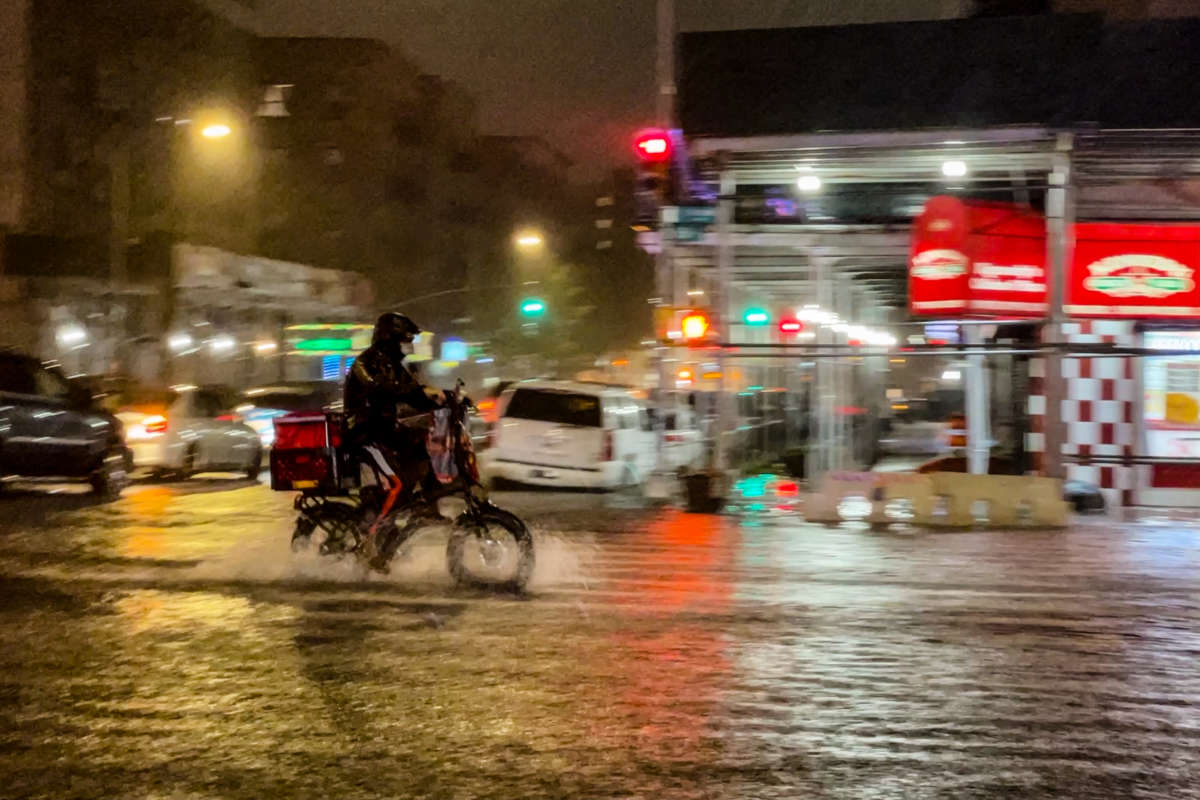During a typical downpour, the rainwater also pours gobs of cash in tips into the pockets of immigrant gig workers as they zip around the city delivering takeout to New Yorkers hunkering down at home. Flash flooding warnings are not a case for worry; they are signs of a boon to come, as food delivery apps like GrubHub, DoorDash, and Relay offer bonuses to entice workers to traipse through snow and rain to feed homebound residents. On these days of extreme weather, upwardly mobile customers are apt to be less stingy.
But the incongruity between the expectation of high earnings and the realities of a hurricane storm dumping a historic five to seven inches of rain couldn’t have been starker September 1.
“We lost more than we earned,” says Miguel Reynoso, 34, a Guatemalan member of Los Deliveristas Unidos, or Delivery Workers United, a gig worker collective.
Reynoso was delivering food for GrubHub at 9 p.m. in Manhattan when his $1,300 scooter broke down. The food app paid him $5 based on time spent and miles traveled for that order, and the customer tipped him $6; his total earnings after working 10 hours that day were $240. He says GrubHub had a $12 promotion for completing three delivery trips in a row. But his decision to brave the rain cost him $160 to repair the carburetor on the scooter after it filled with water and stranded him miles from his home in the Bronx.
Reynoso is an independent contractor — but one with severely circumscribed independence. He isn’t allowed to decline orders after signing up to be on the app schedule for deliveries. GrubHub didn’t suspend service, according to gig workers. He doesn’t receive health care, paid time off, workers’ compensation, or even a minimum wage guarantee. GrubHub isn’t responsible for fixing his wrecked scooter’s motor.
The trail of destruction left behind by Hurricane Ida rendered inoperable hundreds of scooters that immigrant gig workers like Reynoso depend on to earn a living, said Ligia Guallpa, executive director of Worker’s Justice Project. The worker center in Brooklyn, which has provided critical support to Los Deliveristas since the group was formed last year, is running a fundraiser to help workers fund repairs and pay for replacements.
Perilous Conditions
At least 21 people are dead in New York and New Jersey. Eleven of the fatalities occurred in Queens, where residents died trapped in their homes as water rushed in. They had heeded the official message from Mayor Bill de Blasio: “Stay inside.”
Deliverista Toño Martinez, 34, a resident of Queens, never planned to stay home. “We thought it was going to be a good day. We go out come rain or snow,” said Martinez, a native of Mexico who has worked mostly for restaurants. He transitioned to app-based food delivery a little over a year ago.
Martinez said working an eight-hour shift for GrubHub on a rainy day he would typically earn $300. However, by 9:30 p.m. on Wednesday, an onslaught of rainwater rising waist-deep around him, Martinez called it quits, after waiting an hour for $5 on a delivery. Wading past parked cars inundated by floodwaters, after nearly eight hours in the rain, he ended the night with a measly $110.
The blessing was escaping unscathed, and with the motor of his gasoline-powered scooter still working.
“The rain hit hard; the drops hurt on my face,” wrote another Deliverista, Antony, via text message. (He asked to only use his first name, fearful of retaliation from the app.) Despite the platform Relay offering a $2 bonus per trip, he logged off at 8 p.m. having earned $110 in three hours — worried he’d be stranded as the rain pelleted him.
Better Wages Demanded
Food delivery workers may have saved lives by making it possible for other New Yorkers to remain indoors dry and safe during the record-breaking rainfall.
After a video on social media went viral — it showed a food delivery worker submerged in water carrying food in a white plastic bag — the admonitions poured in to tip generously or forgo ordering takeout. Those posting were right to recognize the workers’ essential labor, but most missed the solutions that delivery workers themselves are calling for.
“Every sacrifice deserves to be rewarded,” says Reynoso. The reward he has in mind is GrubHub increasing its base pay for deliveries to $8, instead of its opaque calculations on time and miles.
Martinez is hopeful about “a package of bills that will help us have better wages.” Los Deliveristas have fought for legislation at the city level to boost wages, among other demands. Recently they defeated a state proposal that would have relegated them to a third-class category of employee. Said Martinez: “We’ll continue to fight.”
Press freedom is under attack
As Trump cracks down on political speech, independent media is increasingly necessary.
Truthout produces reporting you won’t see in the mainstream: journalism from the frontlines of global conflict, interviews with grassroots movement leaders, high-quality legal analysis and more.
Our work is possible thanks to reader support. Help Truthout catalyze change and social justice — make a tax-deductible monthly or one-time donation today.
